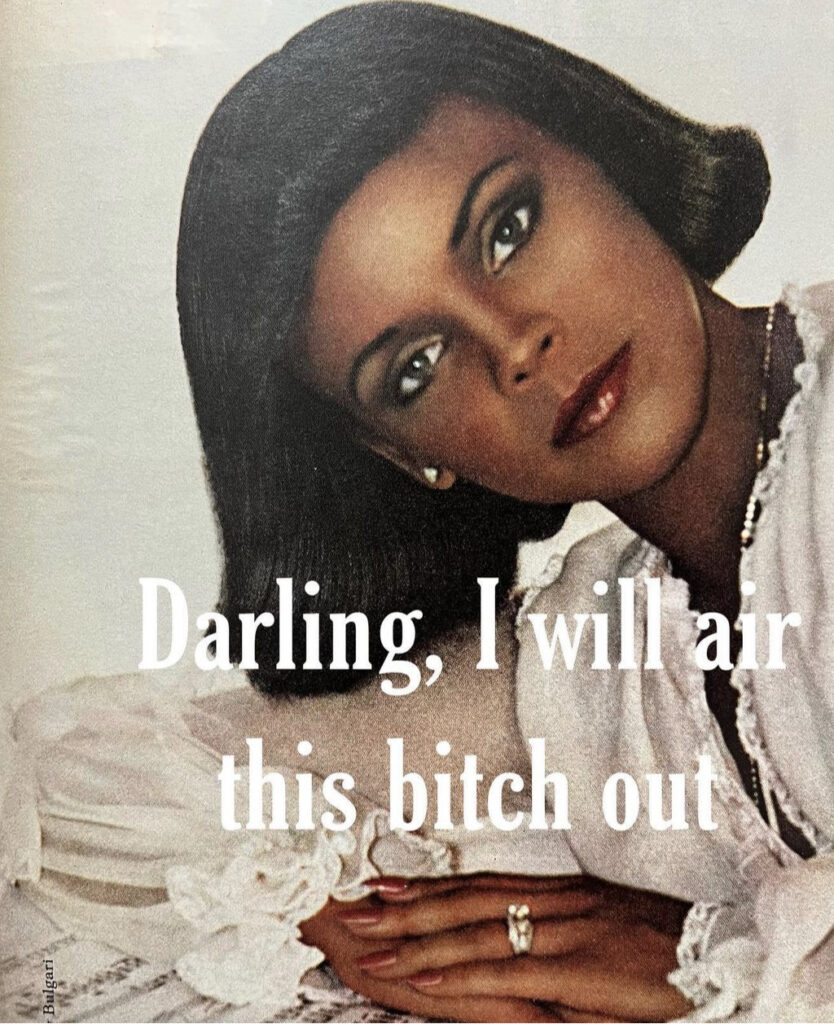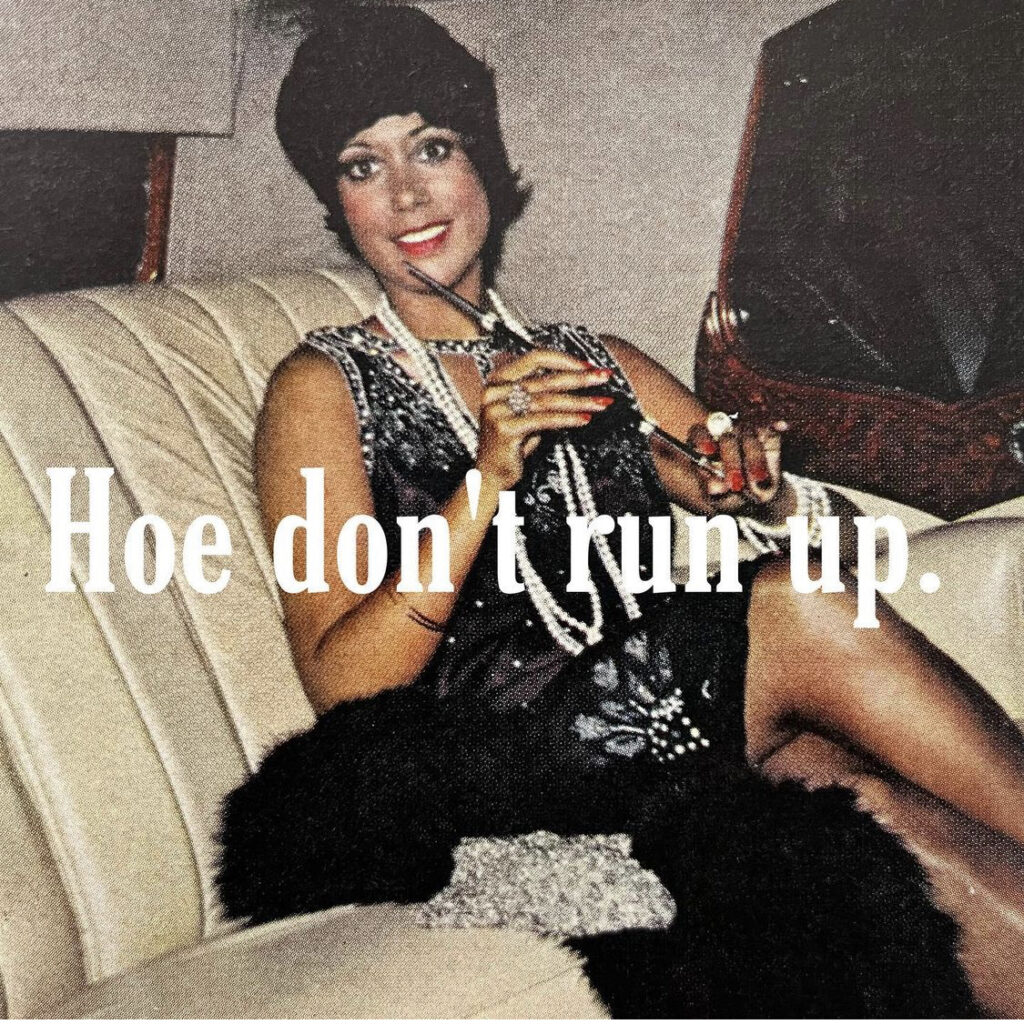The Language and Rules That Exclude (And Execute) Women

By Trelani Michelle and Diamond Afeni
“They didn’t burn witches. They burned women.”
I don’t remember exactly who said that, but it stuck with me. They burned women who talked back, women who asked questions, women who healed themselves and each other, women who chose their own paths. They burned mothers, sisters, grandmothers, aunts, teachers, historians, evangelists, and artists. By labeling them “witches,” however, their humanity was stripped and their murderers were seen as heroes.
That’s what happens when the word “vulgarity” comes into play. Even if the woman herself is not killed, oftentimes her reputation is, her contribution to the cause is, and her livelihood is threatened as a result. This article will point out examples in which this has been the case.
Vulgarity refers to those with poor taste or those who are “un-refined.” It doesn’t make women any less educated or undesirable. Vulgarity is language, and language is used as means of expression, which is exactly what Nina Simone did with Mississippi Goddamn. She used language to express her rightful anger and disappointment according to what she’s both witnessed and experienced.
Nina
Nikki Giovanni mentioned that Reverend Dr. Martin Luther King Jr. thought that Nina Simone’s “Mississippi Goddam” was too vulgar to make a statement on behalf of the Movement. The lyrics address the racial and social violence that the Civil Rights Movement targeted. She wrote the song to voice her anger—and, as you can imagine (given the time period), the language of the song raised concerns.
Alabama’s gotten me so upset
Tennessee made me lose my rest
And everybody knows about Mississippi Goddam
…
You don’t have to live next to me
Just give me my equality
Everybody knows about Mississippi
Everybody knows about Alabama
Everybody knows about Mississippi Goddam
This left us thinking about the way that language can be biased, especially when it comes to women. Women have been frowned upon for language or even behavior that has been coined vulgar by men. These women are viewed as less favorable, or even perhaps Jezebels (biblical reference to “shameless, morally unrestrained” women).
But the reality is that these beliefs are meant to keep women in boxes. Simply put, vulgarity ain’t the problem. Language is. Tradition is. Values are.

Photo cred: @blackvintageadhumor
Zora
Their Eyes Were Watching God is one of the most classic pieces of literature. Published in 1937, Zora Neal Hurston writes about a female character named Janie—about Janie’s deliberate choices to maintain her freedom. As Toni Morrison said best, “Freeing yourself was one thing; claiming ownership of that freed self was another.”
 From the way Janie clapped back at her husband, dressed in pants and overalls, fell in love with a tenderoni, and the mere fact that she married three times, this novel did a beautiful job of exploring the intersections of race, class, sex, sexuality, and reversed gender roles. Sex was supposed to be a productive experience for woman, a performance, and yet Janie dared to get her some pleasure from it. As one could imagine, the novel was criticized.
From the way Janie clapped back at her husband, dressed in pants and overalls, fell in love with a tenderoni, and the mere fact that she married three times, this novel did a beautiful job of exploring the intersections of race, class, sex, sexuality, and reversed gender roles. Sex was supposed to be a productive experience for woman, a performance, and yet Janie dared to get her some pleasure from it. As one could imagine, the novel was criticized.
Even Zora as a writer-artist was considered vulgar in her day. Her peers often rolled their eyes at her. To them, she wrote in ways that held us back. We were supposed to be creating art that reflected the horrors of society, namely racism. Instead, she wrote novels that seemingly disregarded what black folk were going through at the hands of white folk. It was in there, but it wasn’t loud enough for them.
On top of that, she dared to use verbatim dialect in her writing. She used Ah’m instead of I’m, ‘oman instead of woman, and shet instead of shut. To her peers, that kinda language held black folk back. It was unrefined, without class, and therefore “vulgar.”
There’s always this notion of what we should or should not be doing.
One of my favorite quotes from Women Who Run With the Wolves: Myths and Stories of the Wild Woman Archetype states:
“I’ve seen women insist on cleaning everything in the house before they could sit down to write… and you know it’s a funny thing about housecleaning… it never comes to an end. Perfect way to stop a woman. A woman must be careful to not allow over-responsibility (or over-respectability) to steal her necessary creative rests, riffs, and raptures. She simply must put her foot down and say no to half of what she believes she “should” be doing. Art is not meant to be created in stolen moments only.”

And art ain’t just paint on a canvas. It’s self-expression in all forms. How you adorn and speak up for yourself is art. Your mere existence is art. How many internalized opinions dictate how you showing up in the world?
Erykah Badu
They loved her until she took her clothes off on the video set of “Window Seat.” It was partially her intent. In an interview, she said that had she been walking the street in stilettos and a wig, all would have been well. But when women’s nudity is not packaged for the male consumption, then it’s not okay.
She looked DAMN GOOD in that video, don’t get us wrong, but it was also obvious that her intent was not to be sexy. She looked more along the lines of “sick and tired of being sick and tired” (word to Fannie Lou Hamer). From that to…liberated and just not giving a damn about any of it anymore. She looked…free.
Her shedding clothing was her shedding the teachings/beliefs that were sewed into her. All the notions of what she should and should not were peeled off and thrown aside. Once she finished “unlearning” and was completely undressed, she was assassinated. She went against the grain. She wasn’t supposed to do that. And she paid the price for it.
In an interview by Faima Bakar, language consultant Tony Thorne stated:
“Not all men have evolved in terms of the way they perceive appropriate behavior for women. Some men ‘cling to macho attitudes.’ Likely due to insecurity, they either choose to, or purport to, believe in dated concepts such as ‘ladylike women don’t use bad language.’”
“Bad language” ain’t just cuss words, though. It’s also Janie checking her man in public, despite the fact that she was responding to his blatant disrespect and name-calling. Once upon a time, it was talking about politics; since that was considered a man’s world. It’s talking about sex, what you like and don’t like. It’s dancing too slow or too fast or with too much hip. It’s disagreeing with the status quo.
Ladylike or Respectability Politics?
Respectability politics is the notion that you’ll be successful and safe, if you dress/speak/behave in a way that Queen Elizabeth would approve of. Respectability politics usually target non-white folk and women. So imagine how strict it is with Black women. It’s why we have terms like “ladylike” and “lady in the street.”
The more that women try to be ladies, the more they’ll find themselves with more and more pressure to be less Black. Make sure your edges are smooth and tamed. Don’t replace the “th” with “d” in words like “that.” Leave the cussing for the men. And, for God’s sake, dress like a lady: not too tight, not too baggy, not too short, not too sheer. Leave neon colors alone.
Respectability politics determine who’s sophisticated and who’s ghetto.

Photo cred: @blackvintageadhumor
These dated “ladylike concepts” are used to keep women confined in boxes. It’s not that the behaviors or even “vulgar” language that women are exhibiting is necessarily bad. It’s a matter of challenging rules and beliefs that condition minds to view behaviors attached to women as bad, and not men. That’s why it’s more socially acceptable for men to rap as explicitly as they please, but women are frowned upon for it. (The recent controversy over “W.A.P.” by Cardi B and Meg and the Stallion is an example of this.) Once women do it, now we have to consider the children who might be listening.
Our perceptions of how a group of people should behave is mostly instilled in us through the people who raised us. Either we admire/respect it and want to emulate it, or we despise it and want to distance ourselves from it (even if we sometimes secretly appreciate it). It’s also shaped by the conversations and reactions of our peers, as well as what we see on TV, hear in music, and consume in the trillion dollar industry of marketing.
The goal of this article isn’t to encourage anyone to promote “vulgarity” or feminism (however you define that). The goal of the article is to challenge language, behavior rules, and thinking. The opposite of vulgar, for instance, is tasteful, classy, and refined. Who gets to determine what that looks/sounds like? How close to whiteness might it be? How might it be harming us as a people and holding us back?
“Nobody’s free until everybody’s free.”
Fannie Lou Hamer said that. If she has to monitor how much skin she shows, how loud her voice carries, and how hard she rocks the boat, then that means there’s also a role/expectation for those who don’t identify as women to fill as well. And dem shoes might not be comfortable, but you gotta pretend that they are.
Behavior and language barriers exist because of taught beliefs.
Peel back the layers. An excellent place to start is where you’re judging someone else. Whenever you feel that someone should or shouldn’t be doing something, that’s an opportunity to check your taught beliefs. It could’ve been taught, or it could be an insecurity. Also check your language. Experiment with different words. Like in the beginning of this article, women replaced witches and it made a world of difference.
Language and rules are biased.
And women don’t owe y’all shit.
___
Much love to our new and recurring monthly patrons:
Jessi, June Johnson, Yolanda Acree, Cala, D. Amari Jackson, Yvonne Carter, Add your name here
Your monthly contributions give us the resources to pay black writers and artists, and get more creative and consistent in the content we deliver. We put a lot of time, love, and money into researching, writing, and sharing. Click here to learn more.


